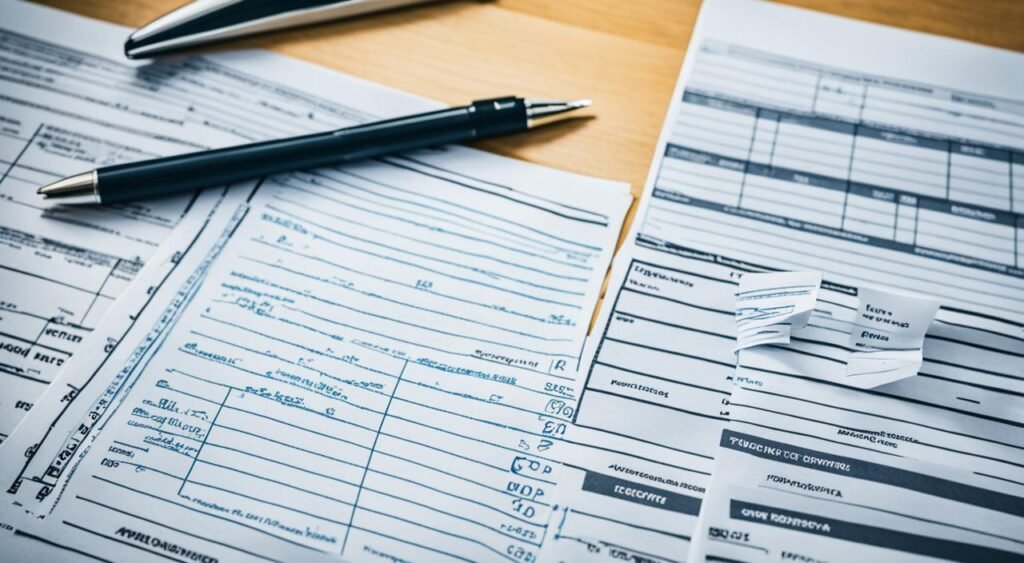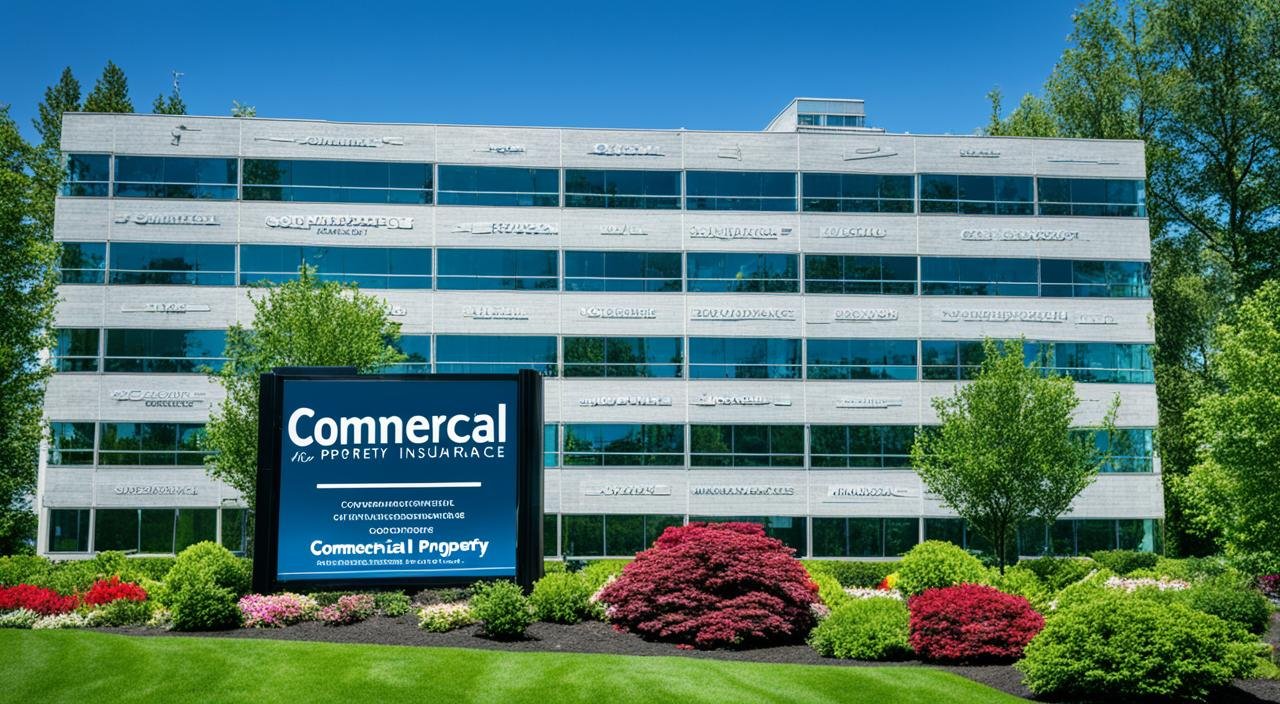Commercial property insurance is key for businesses. It protects against many risks, like natural disasters and theft. Because of this, owners can lessen the effects of unexpected events and keep their businesses running. Knowing how to file a claim is crucial for a quick and positive outcome.
This guide will cover everything about commercial property insurance. We’ll define it, look at what it covers, and explain why it’s important. You’ll also learn how to file a claim, including what steps to take and how to ensure you get a fair deal. By the end, you’ll understand the ins and outs of commercial property insurance.
Key Takeaways
- Commercial property insurance guards businesses from several dangers, like natural disasters and theft.
- Learning about the claims process is vital for business owners. It helps ensure they get a fair deal and can resume operations quickly.
- There are crucial steps in the claims process, such as reporting the incident and negotiating a settlement.
- Keeping good inventory records and thinking about extra coverage can make the claims process smoother.
- Choosing an insurance partner with a great reputation and strong customer service is key for good coverage.
Understanding Commercial Property Insurance
Commercial property insurance is crucial for business protection. It covers items like buildings, equipment, and inventory. For any business owner, knowing about this insurance is key to keeping their investments safe.
Definition and Coverage
Commercial property insurance protects a company’s physical assets. It includes things like buildings, machinery, and inventory. The coverage ensures protection from natural disasters, fires, theft, and damage.
Importance for Businesses
Businesses of all sizes need commercial property insurance. It safeguards against the loss of important assets. Without it, a disaster could completely halt operations.
This insurance also offers business interruption coverage. It helps cover expenses and lost income during repairs. For businesses relying on a physical place for income, this is vital.
| Coverage Type | What It Covers |
|---|---|
| Building Coverage | Damage or destruction to the physical structure of the business, including the roof, walls, and foundation. |
| Business Personal Property | Damage or loss of equipment, furniture, inventory, and other valuable items used in the business operations. |
| Business Interruption | Lost income and additional expenses incurred during the restoration process following a covered loss. |
“Commercial property insurance is a critical safeguard for businesses, helping to protect their physical assets and ensure business continuity in the face of unexpected events.”
Common Causes for Filing Claims

Commercial property owners often need to file insurance claims. These claims can be due to natural disasters, theft, or accidental property damage.
Natural Disasters
Natural disasters like hurricanes and floods can badly damage buildings and equipment. Repair costs can be high. Owners need a commercial property insurance claim to recover these costs.
Burglary and Theft
Commercial property theft is a big issue, leading to insurance claims. Thieves can steal valuable items, like equipment or inventory. Filing a claim helps replace what was lost or damaged.
Accidental Damage
Accidental harm to property is another reason for claims. A burst pipe or a fire can severely damage a building. The right commercial property insurance coverage ensures quick recovery.
“Preparation is the key to minimizing the impact of potential disasters on your commercial property.”
Step 1: Incident Reporting
The first big step in commercial property insurance claims is reporting the incident. You need to tell your insurance company as soon as possible. If you wait, it could lead to trouble getting your claim approved.
Prompt Notification to Insurer
Right when you know about the incident, call your insurance company. Give them important details like the incident’s date, time, and where it happened. Always keep your policy number at hand for the call.
Providing Detailed Information
When you report the incident, be ready to share all the details with your insurer. Tell them about the damage, any injuries, and what you did to reduce the problem. Sharing more info helps your insurer understand your claim better and start helping you.
Starting your commercial property insurance claim includes telling your insurance quickly and giving them lots of information. This helps them begin the commercial insurance claim filing process fast and smoothly.
“Timely reporting of an incident is crucial when filing a commercial property claim. The faster you notify your insurance, the sooner they can work on your claim. This helps get your business running smoothly again.”
Step 2: Documentation

After you tell your insurance company about the incident, document everything. This means collecting and keeping any evidence from the event and its results. It acts as important proof for your claim.
Gathering Evidence
Start by collecting things that show the damage or loss. Include photos, videos, receipts, and any other documents you have. This careful documentation will make your claim stronger, helping you get a good result.
Witness Statements
Ask anyone who saw what happened to give a written account. Make sure they write down what they saw, when it happened, and any other relevant details. Including witness statements for commercial property insurance claims can make your claim more believable.
Correspondence Records
It’s also important to keep track of your conversations with the insurance company. Save any letters, emails, and notes from phone calls about your claim. This paper trail can help you follow your claim’s progress and deal with any issues that come up.
By gathering evidence and records to keep for a commercial property insurance claim, you’re setting the stage for a successful claim. Taking this detailed approach greatly boosts your chances of both a successful insurance claim for commercial property and a positive outcome with your insurer.
Step 3: Assessment by the Insurer
After you report the incident and back it up with evidence, the insurance company will dig deep. They’ll thoroughly investigate the claim to check if it’s valid. This is key in deciding how much to settle for.
Claims Adjuster Visit
A claims adjuster will visit to look at the situation. They work for the insurance company. They’ll closely examine the damage and take notes. Also, they’ll want to hear from witnesses and see photos to get the full picture.
Investigating the Claim
The insurance company dives deep into the claim. The adjuster checks everything against the policy. This includes the damage’s cause and whether it’s covered. They make sure they understand the whole claim before deciding on a settlement.
| Claim Assessment Factors | Description |
|---|---|
| Cause of Damage | The adjuster will investigate the root cause of the damage to the commercial property, ensuring it is covered under the policy. |
| Extent of Damage | The adjuster will carefully document the scale and severity of the damage to determine the appropriate settlement amount. |
| Policy Coverage | The adjuster will cross-reference the claim details with the policyholder’s coverage to verify that the incident is indeed covered. |
| Mitigating Actions | The adjuster will assess whether the policyholder took reasonable steps to mitigate the damage and prevent further loss. |
The insurance team’s careful assessment is how they figure out the right settlement. This process ensures a fair deal for the policyholder.
Step 4: Settlement Negotiation
After the insurer reviews your claim, the next big step is negotiation. This is where you can talk about the settlement offer. You might not agree with the first option and that’s okay.
Understanding the Settlement Offer
The insurance company’s offer is based on your policy and their investigation. It tells you the amount they will pay for your losses. Make sure the offer covers everything you need it to.
Negotiation Strategies
Feeling like the offer is too low means you can push for more. Here are some good ways to do that:
- Give more evidence that shows your loss’s true value.
- Get another expert’s opinion on the damage.
- Talk to a claims pro or a lawyer to make sure you’re treated fairly.
Negotiating with your insurer can be tough. But, with a good strategy and understanding, you can work towards a better deal.
| Negotiation Tactic | Potential Benefit |
|---|---|
| Provide additional evidence | Supports the true value of the damaged property |
| Obtain an independent assessment | Offers a different perspective on the damages |
| Consult with a claims professional or attorney | Helps ensure a fair settlement offer and protect policyholder rights |
“Being smart in negotiations can lead to a better deal. Use the right tactics and you can recover more, faster.”
Commercial Property Insurance
Commercial property insurance is key for protecting businesses. It covers buildings, equipment, and inventory. Choosing the right policy is important. It guards against many risks your business might face.
Types of Commercial Property Insurance
Businesses can pick from several commercial property insurance types. They vary in coverage level. The main ones are:
- Basic Property Coverage: It safeguards against fire, theft, and vandalism. It covers repair or replacement costs for the damaged/stolen items.
- Enhanced Property Coverage: A broader policy, it includes protection from natural disasters, burst pipes, and other accidents.
- Specialized Coverage: For businesses with unique needs. It might cover expensive equipment or digital risks, like cyberattacks.
Choosing the Right Coverage
To choose the best policy, look at the risks your business faces. Think about the value and risk to your assets. Consider the area’s natural disaster potential and any unique vulnerabilities.
Picking a policy that meets your business’s needs is key. It ensures you can recover from surprises. Review your policy regularly to keep up with any changes in your business.
“Investing in the right commercial property insurance can provide peace of mind and financial stability for your business, allowing you to focus on growth and success.”
Step 5: Payment and Restoration
After you go through the claims process, the next step is getting the payment for your commercial property claim. You then use this money to fix or replace what was damaged. This is key for businesses to quickly get back on track and lessen the impact of what happened.
Receiving Claim Payment
When you agree to the settlement an insurer offers, they will pay you. This money is for the repair or replacement of the commercial property. You can use these funds to make your business like it was before the incident.
Repairing or Replacing Property
Getting the commercial property insurance claim payment allows the policyholder to start work. This includes hiring contractors or buying new equipment. The goal is to reopen the business as soon as possible.
If you can’t agree on the settlement, you might go through more steps. This could mean getting an appraisal, working with a public insurance adjuster, or talking to a lawyer. It depends on the situation and what your insurance says.
“The key to a successful restoration is having the right resources and expertise to efficiently rebuild and recover from the damage.”
Handling the receiving commercial property insurance claim payment and repairing or replacing damaged commercial property after a claim properly is crucial. This helps businesses reduce the time they’re closed, protects their setup, and leads them to bounce back even better.
Tips for Smooth Claims Process

Dealing with commercial property insurance claims can be tough. But there are ways for business owners to make it easier. It’s crucial to keep detailed inventory records and think about buying extra coverage.
Maintaining Inventory Records
It’s vital for businesses to keep thorough inventory records. Regularly take photos or videos of your property and items. Also, make lists of all your equipment and valuable things. This documentation is key if you ever need to file a claim. It can help your case and speed up the claim process.
Considering Additional Coverages
Basic property insurance pays for fixing or getting new items after damage. But it’s smart to think about extra coverages too. For instance, business interruption insurance helps with lost income and extra costs during repairs. This way, your business can bounce back faster.
It’s also wise to look into flood insurance, earthquake coverage, and cyberattack protection. These add-ons can give you peace of mind and reduce the financial hit of a damaging event.
“Preparing for the unexpected is key to navigating the commercial property insurance claims process with confidence and resilience.”
By keeping good records and checking out extra coverage, business owners can improve their insurance claim experience. This can protect their business and ensure they recover quickly.
Denied Claims and Appeals

As a business owner, your commercial property insurance is key for protecting your investments. But sometimes, insurance companies say no to claims. This can put you in a tough spot. Knowing why they might refuse a claim is vital. Understanding how to appeal can help protect your rights and make sure your claims get looked at properly.
Reasons for Claim Denial
There are a few reasons why insurance companies deny commercial property insurance claims. These include:
- Claiming the incident is not covered by the policy
- Alleging the policyholder waited too long to file the claim
- Suspecting fraudulent activity or misrepresentation
- Disputing the extent or nature of the damage
- Determining that the policyholder failed to take necessary precautions to prevent the loss
Appealing a Denied Claim
If you’ve had a commercial property insurance claim denied, you can appeal it. Here’s how:
- Write a response letter explaining why you believe the claim should be covered, providing supporting documentation and evidence.
- Contact your state’s insurance regulator for assistance in navigating the appeals process and ensuring your rights are protected.
- As a last resort, consider hiring a legal professional to represent you and fight the claim denial in court.
Remember, persistence and attention to detail are key in appealing a denied claim. Understanding the appeals process, and standing up for your rights, can improve your chances of success. This ensures your business is well protected.
“Don’t be discouraged if your initial claim is denied. The appeals process is there to help you fight for the coverage you deserve.”
Choosing the Right Insurance Partner
Your choice of commercial property insurance provider matters a lot. It can greatly affect how smoothly you handle claims. Picking the right partner ensures your business sails smoothly through claim processes.
Reputation and Customer Service
When looking for commercial property insurance, focus on the provider’s reputation and service quality. A good insurer will quickly and fairly process your claims. The value of a provider’s reputation and service is crucial. They impact how well your business bounces back from an incident.
Third-Party Claim Negotiation Services
There are special services available for commercial property owners. These include third-party claim negotiation. This means skilled negotiators will work for you to ensure a fair claim. These services can make a huge difference in your claim’s outcome and your business’s stability.
Consider the insurer’s customer service reputation and negotiation services when choosing commercial property insurance. These things really matter. They can make your claims experience better, protecting your business and reducing financial loss.
“Selecting the right insurance partner can help commercial property owners navigate the claims process more smoothly and minimize disruption to their business operations.”
Also Read: Top Tips For Saving Money On Business Insurance Premiums
Conclusion
In conclusion, the process for making commercial property insurance claims is key. It helps in protecting a business’s stuff and keeping it running. Knowing the steps from reporting something bad to getting paid helps business owners a lot.
Picking the right insurance company makes a big difference. Go for one known for great service and quick claims handling. Also, keep good records of what you have and think about extra coverages for more safety.
The details about filing an insurance claim in this article are very useful for owners. It gives them the info they need to protect their investments. And, it shows how to deal with unexpected issues better.
FAQs
What is commercial property insurance?
Commercial property insurance covers a business’s physical assets. This includes buildings, equipment, and inventory. It protects against losses from natural disasters, fires, and theft.
Why is commercial property insurance important for businesses?
It’s vital for businesses to protect their assets. This insurance helps ensure they can keep running after a loss. It also covers expenses and lost income during the recovery.
What are some common causes for filing a commercial property insurance claim?
Businesses usually file claims for natural disasters, burglary, or accidental damage. This can be from fires, burst pipes, or even theft.
What is the first step in the commercial property insurance claims process?
The first step is to report the incident to your insurance. Notify them quickly and give all the details about what happened.
What is the next step in the commercial property insurance claims process?
The next step is to document the damage. This means collecting evidence like photos, videos, and receipts. You need to keep any information that shows the impact of the incident.
How does the insurance company assess the claim?
The insurance company assesses the claim with a visit from a claims adjuster. They review the damage and collect more information if needed. Then, they decide how much the insurance will cover.
What happens after the assessment?
After assessing the claim, the insurer makes a settlement offer. This offer is based on the adjuster’s findings and the policy terms. If you think it’s not enough, you can negotiate for a better deal.
What are some tips for maintaining a smooth commercial property insurance claims process?
To keep the process smooth, maintain detailed records of your business assets and damages. Consider getting coverages like business interruption insurance too. It’s also wise to work with an insurer known for good customer service and quick claims handling.
What happens if a commercial property insurance claim is denied?
If your claim is denied, you can write a letter in response. Explain why you think it should be covered. You can also seek help from a state insurance regulator or hire a lawyer to challenge the decision.





